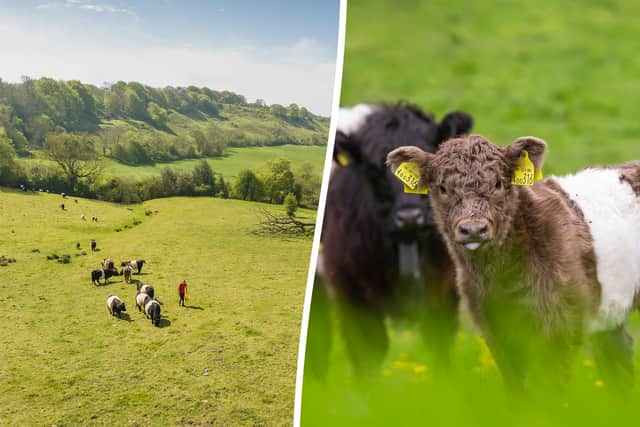How 100 cows deployed as a “secret grassroots weapon” are helping to preserve 50,000 acres of the Cotswolds
and live on Freeview channel 276
This article contains affiliate links. We may earn a small commission on items purchased through this article, but that does not affect our editorial judgement.
Conservationists attempting to preserve some 50,000 acres of the Cotswolds have unveiled their new “secret grassroots weapon” - 100 cows. The Stroud Landscape Project in Gloucestershire spans over 21,000 hectares, and is aiming to make the landscape in the area richer for nature.
The National Trust is now taking help from 100 Belted Galloway Cattle to produce a network of wild areas less vulnerable to climate change. Belted Galloways, also known more affectionately as “Belties”, are masters at grazing steep slopes and at devouring grasses most other animals would find less appetising.
Advertisement
Hide AdAdvertisement
Hide AdWith the Belties’ help, delicate plants and herbs such as marjoram, thyme, vetches and rare orchids are thriving along with a wide range of wildlife such as greater horseshoe bats and Duke of Burgundy butterflies. Deployed at just the right time and in the right numbers, the cows manage the grasslands, and depending on the wildlife to be encouraged they can leave the grass long or short, acting as natural lawn mowers - and fertilisers.
This year, a young pedigree Beltie bull named Charlie is joining the Stroud Landscape Project mowing team. Charlie is red and white as opposed to the more familiar ‘humbug’ striped black and white of a Belted Galloway.
Studies have revealed how this simple change to fur pattern is having a positive impact on both the herd and the environment. Matt Watts, National Trust Farm Manager said, “We’re already seeing hotter, drier summers as a result of climate change.
''There have been a lot of studies on heat stress and coat colour in livestock, with lighter coated cattle proven to cope better with the heat, so this year we took the decision to buy a red and white bull.
Advertisement
Hide AdAdvertisement
Hide Ad“Charlie is settling in well and we’ll see his first offspring next spring. In the future we hope to have a future-proof conservation grazing herd, and one that is key to the way we manage and maintain this wilder, species-rich landscape.”
Some of the Belted Galloway herd have now moved into Woodchester Park as part of the Stroud Landscape Project’s plans. Here, the Belties’ are supporting a colony of rare horseshoe bats whose summer roost is in Woodchester Mansion at the heart of the park.


At Woodchester Park, plans to accelerate the restoration of nearly 48 hectares of mainly former conifer plantations to species-rich grassland and native woodland are well underway. David Armstrong, Stroud Landscape Project Delivery Manager said, “Our climate is changing at a faster rate than ever, and nature is in trouble.
"The challenge ahead is huge and complex, but the Stroud Landscape Project is confronting the climate and nature emergencies head-on. The solutions can be simple, and many are very much within our grasp – we need to create havens for wildlife that boost biodiversity.”
Advertisement
Hide AdAdvertisement
Hide Ad